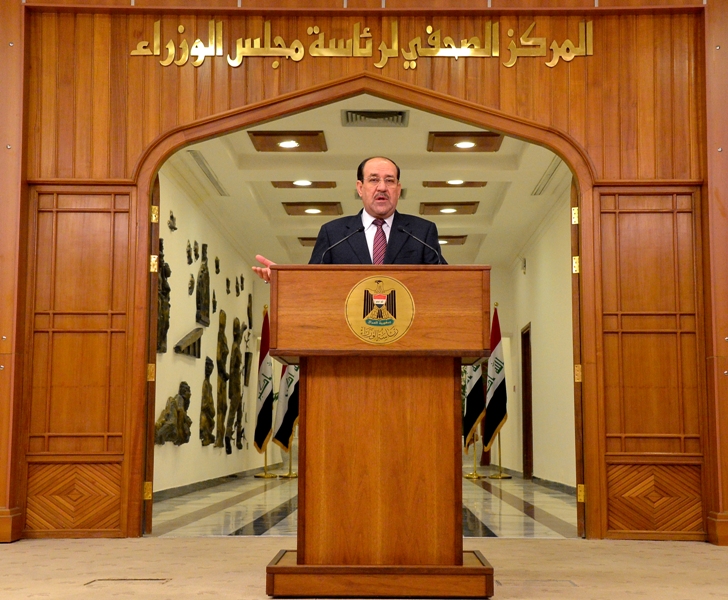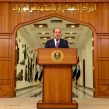
BRIEFS
Publication: Terrorism Monitor Volume: 12 Issue: 6
By:

IRAQI PRESIDENT ACCUSES QATAR AND SAUDI ARABIA OF WAGING A TERRORIST WAR AGAINST THE IRAQI GOVERNMENT
Andrew McGregor
As Iraq descends further into a pattern of intensive sectarian violence and terrorist attacks, Iraqi Prime Minister Nuri al-Maliki has accused Qatar and Saudi Arabia of supporting terrorist groups active in his country, likening this support to a declaration of war:
Al-Maliki concluded that he had no intentions of retaliating, but warned the two Gulf states that “support of terrorism will turn against you.” Al-Maliki reiterated his warning at a Baghdad anti-terrorism conference on March 12, saying “the state that supports terrorism holds responsibility for [the] violence faced by our countries” (Shafaq News, March 12). Al-Maliki added that terrorism in Iraq “does not differentiate between Sunni and Shiite” (Iraqi National News Agency [Baghdad], March 12). Over 1800 Iraqis have been killed in the political and sectarian violence already this year (AFP, March 8).
The Iraqi prime minister’s comments came in the midst of campaigning for parliamentary elections next month and a very public dispute with parliament over his decision to carry on disbursing government funds despite failing to get parliament to ratify the budget. Parliamentary speaker Osama al-Nujaifi has accused the prime minister of violating the constitution and described the decision to disburse funds without ratification as “embezzlement” (Iraq Pulse, March 19). Al-Maliki has little support amongst Iraq’s Sunni minority and is also engaged in a dispute with the Kurds of northern Iraq (Gulf News [Dubai], March 14). A range of Iraqi Sunni and Shi’a political and religious groups denounced the prime minister’s remarks as an effort to deflect attention from his failures in Anbar Province, the heart of the Sunni rebellion (al-Sharq al-Awsat, March 11).
Riyadh described al-Maliki’s accusations as an attempt to cover up the Iraqi prime minister’s internal shortcomings: “Instead of making haphazard accusations, the Iraqi prime minister should take measures to end the chaos and violence that swamp Iraq" (Gulf News [Dubai], March 14; Saudi Gazette [Jeddah], March 11).
Saudi allies Bahrain and the United Arab Emirates (UAE) both reacted angrily to al-Maliki’s accusations against Riyadh, with the UAE summoning the Iraqi ambassador to receive its protest in person (Emirates News Agency [Abu Dhabi], March 12; Arab News [Jeddah], March 13). The Iraqi prime minister’s statement was also condemned by Gulf Co-Operation Council secretary-general Abdullatif al-Zayani, who said the allegations were ”aggressive and baseless” (Kuwait News Agency [Kuwait], March 11). Beyond their political usefulness for al-Maliki, who appears to be focusing on Iraq’s Shi’a voters for support, the prime minister’s remarks are a reflection of the strains being placed on relations between Arab nations by growing Shi’a-Sunni tensions in the Middle East.
GULF CO-OPERATION COUNCIL THREATENS TO SPLIT OVER QATAR’S SUPPORT FOR THE MUSLIM BROTHERHOOD
Andrew McGregor
Changing political alignments in the Gulf region now appear to threaten the continued existence of the Gulf Co-Operation Council (GCC), an important six-nation organization designed to further the political interests of the Gulf’s conservative monarchies with an eye to eventual unification. Though tensions have been growing within the GCC for some time, the dramatic rupture in diplomatic relations between Qatar and three other members of the GCC (Saudi Arabia, the United Arab Emirates [UAE] and Bahrain) over the former’s backing of the Muslim Brotherhood has the potential of dealing a fatal blow to the Council. GCC members include Saudi Arabia, the UAE, Qatar, Bahrain, Kuwait and Oman. Rather than a simple alliance, the GCC is better thought of as a complex network of relationships in which common goals such as security and prosperity are intended to override competing interests.
On March 7, Saudi Arabia declared the Muslim Brotherhood, Syria’s al-Nusra Front, the Houthists of north Yemen, the Islamic State of Iraq and Syria (ISIS) and a little-known group the edict called “Hezbollah within the Kingdom” to be terrorist organizations. A Brotherhood front organization in Egypt expressed “surprise” at Riyadh’s choice to “continue support for the coup” and to “criminalize opposition to the unjust coup” (Ahram Online [Cairo], March 10). Riyadh also gave 15 days for all Saudi citizens engaged in fighting abroad to return home without penalty. Under a decree issued by King Abdullah on February 3, Saudi citizens fighting in conflicts outside the kingdom will face imprisonment for a term of three to 20 years, with members of extremist or terrorist groups facing even harsher penalties (Ahram Online [Cairo], March 7).
Saudi Arabia, the UAE and Bahrain withdrew their ambassadors from Doha in early March in an unusual show of dissatisfaction with the policies of a fellow GCC member. Qatar’s foreign minister, Khalid al-Attiya, responded to the moves by asserting that: “The independence of Qatar’s foreign policy is simply non-negotiable” (al-Jazeera, March 18). Qatar was a strong financial supporter of the short-lived Mursi regime in Egypt but now has nothing to show for its investment other than growing diplomatic isolation. The Saudis and the UAE, on the other hand, have backed the military government of Field Marshal Abd al-Fatah al-Sisi with massive financial support to keep the regime afloat in a difficult period and can expect their political influence to grow if al-Sisi becomes the next president of Egypt, as expected.
Saudi Arabia is reported to have warned Qatar that it would be “punished” unless it met three demands; the closure of al-Jazeera (accused by Egypt of backing the Muslim Brotherhood), the severance of all ties to the Muslim Brotherhood and the expulsion of two U.S. institutes from Qatar, the Brookings Doha Centre and the Rand Qatar Policy Institute (Qatar News, March 15; AFP, March 15). The promised alternative is a Saudi air and land blockade of Qatar, which not only relies heavily on imports of food and other goods, but is also an important regional transportation hub. The Saudi and Qatari militaries last clashed along their mutual border in 1992. The UAE has been somewhat less bellicose than the Saudis, given that the Emirates depend on Qatari natural gas for power generation (Financial Times, March 14). Otherwise, Saudi Arabia, the UAE and Bahrain will find it difficult to apply economic pressure on Qatar, which has broad overseas investments, Asian markets hungry for its natural gas production and does only five percent of its trade with the three GCC partners opposing its policies (Bloomberg, March 13).
Qatar continues to host the Brotherhood’s unofficial leader, Shaykh Yusuf al-Qaradawi, an influential preacher with considerable media skills. Qatar’s ambassador to the UAE was summoned to the foreign ministry in Abu Dhabi in February to explain a sermon broadcast from Qatar by al-Qaradawi in which the shaykh condemned the UAE as a nation that opposes Islamic rule. The remarks came a day after UAE authorities imprisoned 30 Emiratis and Egyptians accused of forming a Brotherhood cell in Abu Dhabi (al-Jazeera, February 2). Qatar has offered refuge to fugitive members of the Brotherhood, while the UAE has imprisoned scores of members of the Brotherhood and its UAE affiliate, the Islah Party (al-Jazeera, March 18).
In recent years, Qatar has grown closer to Iran and Turkey, the latter’s ruling Justice and Development Party also being a strong supporter of the Muslim Brotherhood. Qatar’s ties to Shi’a Iran in the midst of an ongoing regional Sunni-Shi’a power struggle are particularly alarming to the Saudis (whose oil-rich Eastern Province has a Shi’a majority) and the Sunni rulers of Bahrain, who are trying to repress simmering discontent in Bahrain’s Shi’a majority. Kuwait appears to be dismayed by the whole dispute and has offered to act as a mediator. The last member of the GCC, Oman, has an Ibadite majority and has traditionally close ties to Iran as part of a resolutely independent foreign policy. Oman is a strong opponent of Saudi-led efforts to create an economic, customs and defense union within the GCC. Egyptian officials announced Cairo had decided not to close its embassy in Doha because of the large number of Egyptian nationals working in Qatar but would not send a new ambassador (Al-Monitor, March 12).
Qatar’s active role in the Syrian and Libyan rebellions has been a leading element of an increasingly aggressive foreign policy that has at times alarmed its conservative neighbors. Despite this, there is a tremendous incentive to cooperation within the GCC as its members will all suffer economically if political disputes lead to blockades, closed borders or confrontations in an already compact and volatile region.





